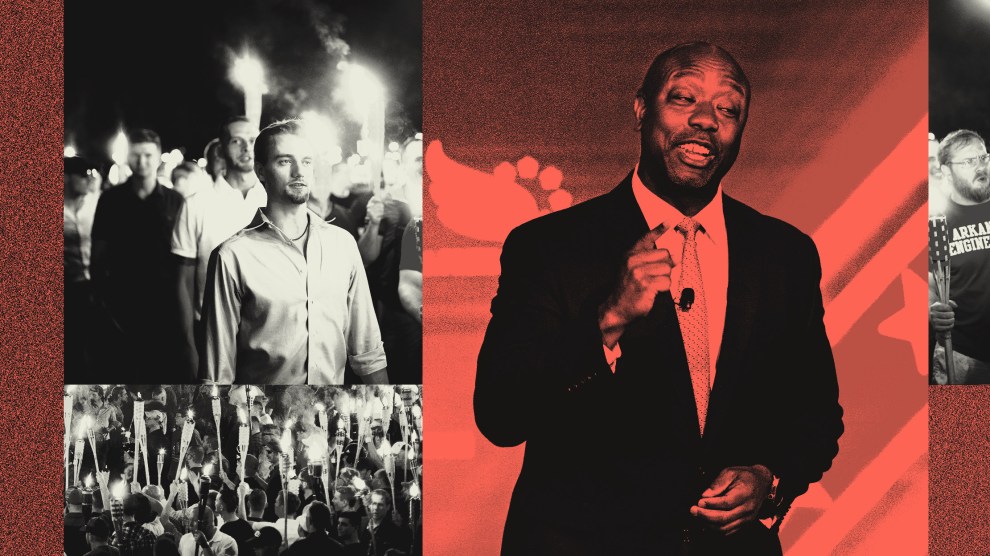
Mother Jones illustration; Ron Sachs/CNP/ZUMA; Zach D Roberts/NurPhoto/ZUMA; Shay Horse/NurPhoto/ZUMA
Once upon a time, Senator Tim Scott from South Carolina condemned racism. Now, not so much. What happened?
The presidential hopeful might be finding it difficult to make headlines in an increasingly crowded Republican primary field, but he’s still hauling in crucial campaign cash. The latest figures, unveiled last week, disclosed that his campaign has accumulated $6.1 million from over 53,000 donors in the second quarter of this year—ensuring his eligibility for the debate stage, alongside frontrunner Donald Trump, should the former president show up. Scott is also spending big, hoping to sway early-voting Iowans with a recent $6 million ad campaign titled “Winning.”
“The radical left is indoctrinating our children, teaching CRT instead of ABC,” Scott says in the video, a phrase that has become something of a campaign catchphrase.
As Scott burnishes his anti-woke credentials on the campaign trail to compete with the more established culture warriors of the far right, I decided to scrutinize his views on race and how they’ve evolved over the years. In this video, I juxtapose Scott’s responses to two racially fueled tragedies: the 2017 Charlottesville Unite the Right rally and the 2022 Buffalo Massacre. These events elicited two completely different responses from the only Black senator in the Republican caucus, which prompted me to ask: What the hell happened in between?
My analysis begins in 2010 when Scott clinched a resounding victory in the US House of Representatives election against Paul Thurmond, whose father, Strom, was a notorious racist figure in the 20th century. Scott’s ability to win in a majority-white district set his political career on an upward trajectory, making him, in some respects, the Republicans’ primary spokesperson on race, or what I describe as the party’s “default DEI Guy”. After the Charlottesville rally, Scott was explicit in acknowledging America’s racial issues. But I quickly noticed a striking shift in Scott’s narrative following the racial tensions triggered by the deaths of Breonna Taylor and George Floyd in 2020. In an email newsletter following the 2022 Buffalo Massacre, Scott stated, “America isn’t a racist country.”
Now, as Scott campaigns for the highest office in the land, an examination of his interviews and speeches reveals rhetoric that is more dismissive of systemic racism than before. Perhaps this shift is a matter of political expediency—saying the things voters want to hear. Or perhaps it’s a genuine ideological evolution. Either way, the most pressing question for his campaign is whether this messaging will resonate with voters ahead of the upcoming Republican primaries. Take a look at the video for yourselves.
















